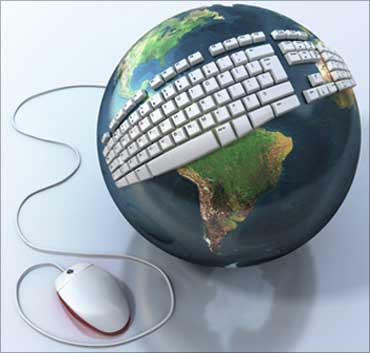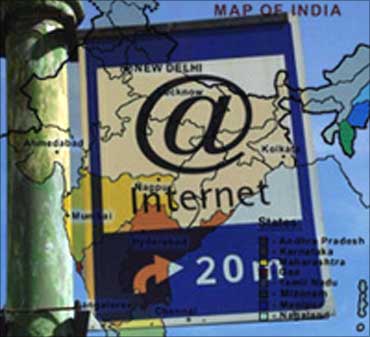
Compared to many parts of the world, access to the Internet content has been relatively free in India.
Unlike people in countries like China, Singapore, Saudi Arabia, etc, Indians do not face any government-controlled restrictions on accessing sites dealing with politics, religion or even mature content.
But that might all change.
In April 2011, the Indian government's Department of Information Technology issued new regulations, Information Technology Rules, 2011, under which any content deemed 'disparaging', 'harassing', 'blasphemous' or 'hateful' can be banned.
The rules require Internet 'intermediaries' -- a broad term that includes anything from web sites like Google videos and Orkut to companies that host sites or provide Internet connections -- to respond to any demand to take down offensive content within 36 hours.
Oddly, the regulations do not even provide a way for content producers or companies to defend their work or appeal a decision to take content down.
. . .

As if all this wasn't enough, the list of objectionable content is broad, subjective and includes anything that 'threatens the unity, integrity, defence, security or sovereignty of India, friendly relations with foreign states or public order'.
So what does it actually mean?
Well, it means that anyone can make lots of noise about any content one finds offensive and the web site or the ISP (Internet Service Provider) can straightaway block the 'offensive' content without giving the content producer an opportunity to defend his case in the court.
In other words, an individual or group of individuals can claim that a Facebook page, or a photo on a web site or even a story is disparaging or harassing or blasphemous or hateful or anti-national and the ISP would have to block it.
Of course, this is not the first time that India has tried to clamp down on Internet content.
. . .

In 2009, it blocked access to a graphic comic strip and it regularly sends take-down notices to social-networking sites, such as Facebook and Orkut, over content deemed offensive to ethnic or religious groups.
Advocacy and civil liberty groups say the Indian Constitution allows 'reasonable restrictions', but to be constitutionally valid the limits have to be very clear and cannot be this vague.
Critics of the new rules say by using such broad and subjective terms like blasphemous, hateful and anti-national, the government is simply trying to control the Internet, the last place not under the control of corporate-government nexus, yet.
They say these regulations will make it extremely difficult for bloggers, commentators, etc, to freely express themselves and share thoughts.
The government defends its stand by claiming that India is a multi-ethnic and multi-religious country and to maintain national harmony it has to ensure that no offensive material is posted either on the Internet or carried by the media.
. . .

It defends its order to ISPs to provide it access to personal information of Internet users by saying that it needs to monitor activities of anti-national elements.
All this, needless to say, doesn't go down well with critics, who say India -- a country that has a well-established information technology industry -- should strive for openness as that fosters and strengthens creativity and scientific enquiry.
Internet service providers, on the other hand, support the new rules, claiming the 2011 regulations are an improvement over the 2008 Act, which was drafted immediately after the terrorist attacks on Mumbai.
That law held ISPs responsible for any content deemed offensive, whereas the new rules do not hold ISPs responsible as long as they have not taken part in creating that content.
Opponents of Internet censorship say instead of taking its cues from censorship-obsessed countries, India -- an emerging powerhouse -- should look towards Scandinavian countries where except for child pornography access to Internet content is completely unrestricted.
. . .

They say restricting access mainly restricts information to less privileged people as they are less likely to be tech savvy to bypass filters.
Civil liberty groups say those with comparatively more skills and knowledge already know how to use tools like proxy servers and virtual private networks to bypass corporate or government restrictions.
'Restricting, filtering or censoring in this day and age is a futile exercise, as there are various tools available in the market, both free and paid, to bypass any type of Internet censorship,' says a user.
He says instead of worrying about what is posted on the Internet, the government should boost measures to expand Internet usage across the country, especially when just 10 per cent of the population has access to the Internet.
The new rules are likely to be challenged in the court, but if the court does not intervene then expect a very different Internet experience.